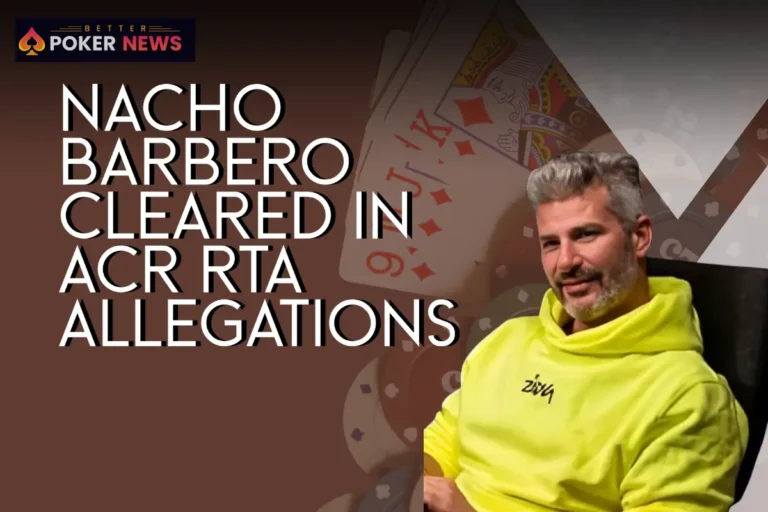In a shocking turn of events, poker legend and ACR ambassador Nacho Barbero found himself at the heart of a heated controversy after an Instagram photo triggered an uproar in the poker community. The image, showing Barbero in ACR Poker’s Venom tournament, accidentally revealed an open GTO Wizard window—a banned real-time assistance (RTA) tool on most poker platforms, including ACR Poker. This led to rampant speculation about potential rule violations, sparking debates across social media. With the poker world watching intently, ACR Poker launched an investigation to shed light on the matter.
Barbero posted a photo on Instagram, casually enjoying his time in the ACR Poker’s Venom tournament. However, sharp-eyed followers quickly noticed an open GTO Wizard window in the background. GTO Wizard, a real-time assistance (RTA) tool, is prohibited on many poker platforms, including ACR Poker, leading to immediate concerns.

The photo quickly went viral on X (formerly Twitter), gaining over 300,000 views. Well-known poker professionals, including Patrick Leonard, were quick to question Barbero’s integrity, while the community engaged in intense debates about the ethics of RTA tools in online poker.
Barbero responded to the backlash, clarifying that he was using GTO Wizard to coach players during a Discord call, rather than using it for personal advantage in the tournament. Despite his defense, skepticism persisted, and many in the community remained unconvinced.
ACR Poker released a statement on X, although the decision to disable comments on the post only fueled further criticism. The platform, under increasing pressure, initiated a formal investigation into Barbero’s gameplay during the Venom tournament.
After an internal review, ACR Poker confirmed there was no evidence of RTA tool usage during Barbero’s participation in the tournament. They officially cleared him of any wrongdoing, concluding that no cheating occurred.
Despite being cleared, Barbero chose to forfeit his remaining chips. He expressed deep regret for the situation and emphasized his commitment to maintaining the integrity of the game and adhering to fair play principles.
Although Barbero was exonerated, the poker community remains divided. Some argue that Barbero’s use of the tool for coaching was still a violation of ACR’s terms of service, while others praise ACR for its transparency during the investigation. Sam Greenwood, another prominent figure, pointed out that while Barbero may not have cheated, his actions still broke the rules.
Patrick Leonard called for GTO Wizard to implement a delay feature to prevent its use in real time. The incident sparked a broader discussion on the need for stricter regulations surrounding RTA tools across online poker platforms.
Leonard also conducted his own review of Barbero’s recent GTO Wizard activity, which aligned with ACR’s findings. However, many players continue to push for tighter enforcement of RTA rules to ensure a fair playing environment.
The controversy surrounding Barbero highlights the ongoing struggle to maintain fairness in online poker. The industry is under increasing pressure to implement effective anti-cheating measures, ensuring that both players and platforms can uphold the integrity of the game.
While the Nacho Barbero incident may have been resolved, the broader debate surrounding the use of real-time assistance tools in online poker remains unresolved. ACR Poker’s investigation cleared Barbero of any wrongdoing, but the controversy raised serious questions about the need for stronger regulations. Industry figures like Patrick Leonard and Sam Greenwood continue to advocate for stricter rules and more transparent processes. As the industry evolves, players and platforms must adapt to ensure the fairness and integrity of the game, highlighting the critical responsibility poker ambassadors bear in maintaining the trust of the online poker community.
While Nacho Barbero has been officially cleared of RTA use, the controversy has left a lasting impact on the poker community. The incident has sparked renewed scrutiny of real-time assistance tools and their potential to undermine fair play in online poker. Though Barbero’s reputation may recover, the broader conversation around RTA tools, transparency, and platform responsibility continues to evolve. ACR Poker’s handling of the situation offers lessons in crisis management, but independent investigations and regulatory changes could shape the future landscape of online poker. Both players and platforms must now navigate this complex, evolving issue to preserve the integrity of the game.
Stay tuned to BetterPokerNews for more such poker world updates!


3 Comments
Pingback: GGPoker Ban: 31 Players Excluded for RTA Use
Pingback: Dual Venom Tournaments Return – ACR Poker Announces $12M Prize Pool
Pingback: Shannon Shorr Wins 2025 U.S. Poker Open